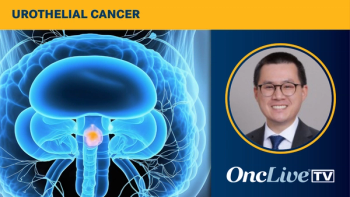
Sequencing Considerations in mUC after Frontline IO
Jeanny Aragon-Ching, MD: I think retreatment with a different checkpoint inhibitor, a PD-1 or PD-L1, after failure of 1 checkpoint inhibitor, is challenging. Retreatment with a different PD-1 blockade inhibitor may be especially effective in those who stop their prior treatment for reasons other than disease progression. We have data to show that even a similar PD-1 agent, ie, pembrolizumab and nivolumab, may target a different epitope of PD-1.
That potentially forms the rationale for using another checkpoint inhibitor. One thing to remember, too, is that PD-1 inhibitors also potentially target 3 different inhibitory interactions. For instance, there are interactions between PD-1 and PD-L1, PD-1 and PD-L2, as well as PD-L1 and B7-1. Each of these checkpoint inhibitors can only inhibit 2 of these pathways.
Another way of thinking about this is we also should probably refrain from using multiple PD-1/PD-L1 inhibitors in sequence on a routine basis outside of clinical trials until we have sufficient data to support this practice because the concern there is if one has already failed 1 checkpoint inhibitor, there's very little response to be gained from switching from 1 checkpoint inhibitor to another in real-life practice. Until we get results from prospective trials that allow prior treatment with a PD-1 or PD-L1 drug, I think we need those data to validate this approach to determine whether efficacy and safety are really warranted in this set-up of sequencing.
There is a very strong rationale for using enfortumab because enfortumab is an ADC product, an antibody-drug conjugate, that targets nectin-4, and nectin-4 is actually overexpressed in most urothelial cancer tumors. The early phase trials of EV-103 looked at the combination of enfortumab and pembrolizumab in the cisplatin-ineligible cohort. Even in that cohort, it was a very striking response, over 70%.
The basis of the FDA approval was EV-201. This was a single-arm multicenter trial that got FDA approval for enfortumab; this is in the third-line setting because their patients failed prior chemotherapy and immunotherapy. Even with the heavily pretreated population of these patients, they still had 44% confirmed objective responses. I think this is a good tool for our patients who failed prior immunotherapy. Again, that's the label right now. There are ongoing studies looking at it as first line in combination with pembrolizumab, with or without chemotherapy.
In any of these algorithms, clinical trials are going to be up there. After all, this is how we get approval of these drugs. If these patients did not enroll in these clinical trials, we would not be able to get to where we are right now. Certainly, in clinical practice, too, we all know that not all patients are going to be great candidates for clinical trials, nor will they all be able to avail themselves of it because of lack of access.
In the lack or absence of a clinical trial, we have to resort to standard of care drugs, for which there are not a lot out there. If a patient truly fails 1 checkpoint inhibitor and the chance of response to another checkpoint inhibitor is very low, then we're left with either erdafitinib—but that's only if the patient tests positive for FGFR alterations—or enfortumab. This is still an area of increased unmet need in bladder cancer.
Transcript Edited for Clarity




































